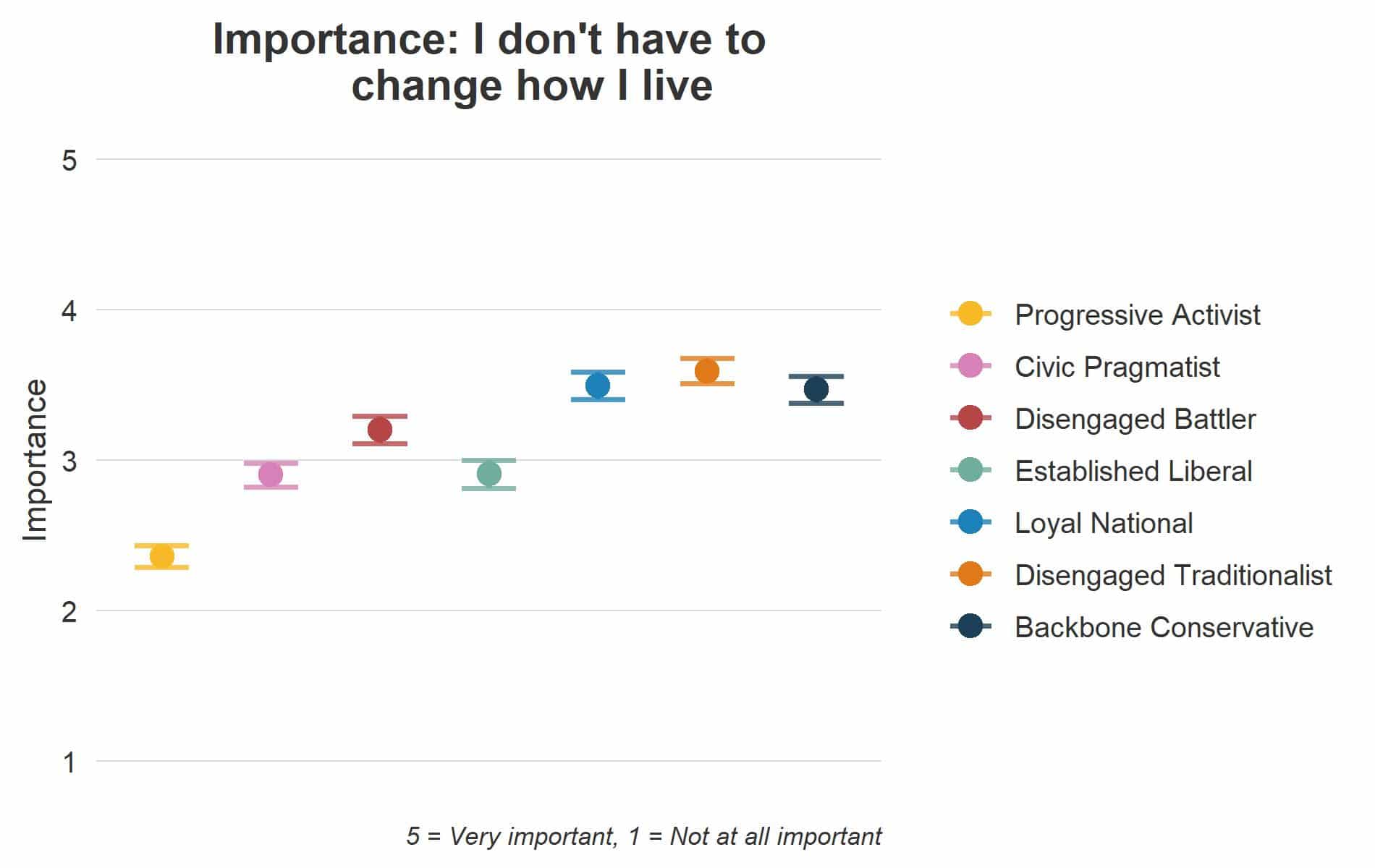Disengaged Traditionalists
Who are Disengaged Traditionalists?
(13% of the British public)
Disengaged Traditionalists are alienated, disillusioned and sceptical – about progress, about society in general, and to an extent about climate change. Like Disengaged Battlers, they feel excluded and frustrated, and unrepresented politically, and they feel that other segments have been prioritised over them.
This segment is more likely to be male (10% above mean). The largest age groups within Disengaged Traditionalists are millennials and baby boomers. They tend to describe themselves as working class, to be of lower social grades and to have low to medium levels of education.
While demographically similar to Disengaged Battlers, this segment skew right on both social and economic issues, and express authoritarian tendencies, showing the second highest level of support, after Loyal Nationals, for a leader who is willing to break the rules (47%, compared to 38% average). Despite their perceived disconnection from the mainstream of society, they are, after Backbone Conservatives, the most likely to say that things in this country are going in the right direction. In this sense, they have a tenacity and ‘survival’ instinct that represents a form of optimism (but a very different one to the comfortable internationalism of Established Liberals).
The table below highlights what an ideal UK looks like for this segment, as well as the issues that are most important to them, the messengers they trust, and their preferred news sources.
| Ideal UK | Most important issues (Feb) | Most important issues (Sept) | Trusted messengers | Most read news sources | |
|---|---|---|---|---|---|
| 1 | Hard-working | Healthcare and the NHS | Healthcare and the NHS | Climate scientists | BBC |
| 2 | Honest | Britain leaving the EU | The economy | David Attenborough | ITV |
| 3 | Educated | The economy | Britain leaving the EU | Farmers | Daily Mail |
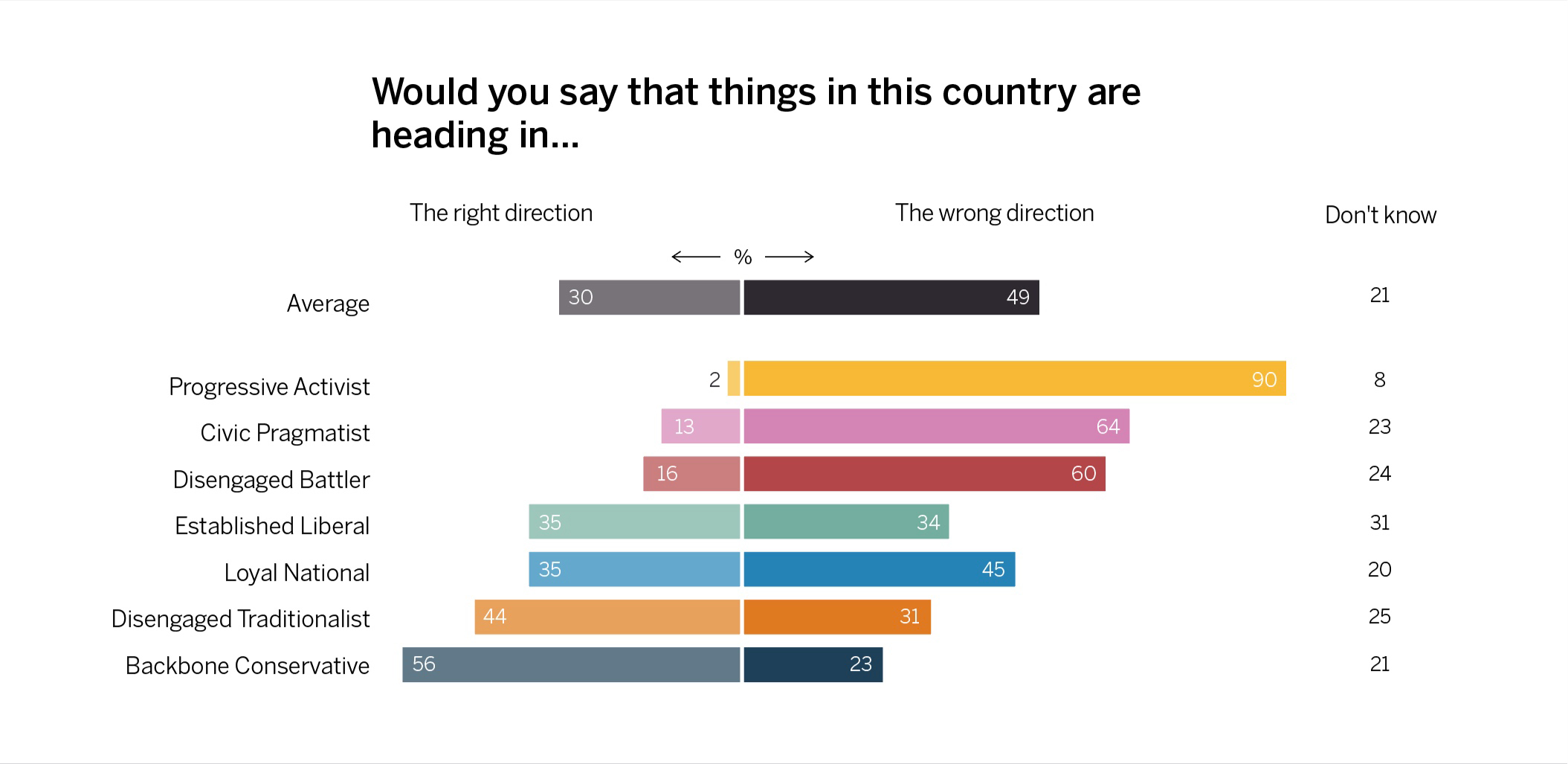
Disengaged Traditionalists are more likely than other segments to say that the country is heading in the right direction
Unlike Loyal Nationals, patriotism is not a defining feature of this segment, but there is a prominent pride in the history of the UK (and its armed forces). They support austerity measures (66%, compared to 48% average), although these measures would likely have affected this segment in a negative way through cuts to council services, and there is fairly low support for the government redistributing income from those who are better off to those who are worse off (35%, compared to 47% average). Their antipathy towards certain groups such as immigrants and benefits claimants reflects the fact that they feel unfairly deprioritised.
The benefits system ... I just think there’s some people that can be better off that are not working, than somebody on minimum wage and I think that’s completely wrong and I think there’s not an incentive … I do feel that the taxpayers pay for people to stay off work and I just don’t think that’s right, to some extent. I think it’s taking advantage of, a little bit.”
Although they are nowhere near as politically or civically active as the relatively mobilised Loyal Nationals, they share their concerns about immigration, with 62% agreeing that we seem to care more about immigrants than about British citizens, and 73% agreeing that people nowadays are too sensitive about things to do with race. Few agree that immigration has had a positive impact on the country, and their ideal UK would be hard-working, honest, educated and highly structured. This segment also singles out politeness, tradition and order as aspirational values for the country.
Although most Disengaged Traditionalists vote Conservative, a significant chunk of this segment are non-voting. While the low political participation of Disengaged Battlers is due to deep scepticism about the system, this segment tends to be less suspicious of the government, with 60% (compared to 43% average) agreeing that once the government has been voted in, they should have much more power to make decisions with less constraints. But people in this segment do not have a clear political ‘home’.
When I was younger, I’d vote for Labour and obviously over the years, as I’ve got older, I’m, oh no, it’s the Conservative and now I’m like, oh God, they’re all just as bad as each other.”
Disengaged Traditionalists on climate change
It would not be accurate to describe Disengaged Traditionalists as ‘climate sceptics’ (outright denial and scepticism do not characterise any of the seven segments), but they are the least likely to agree that climate change is real and caused by human activity.
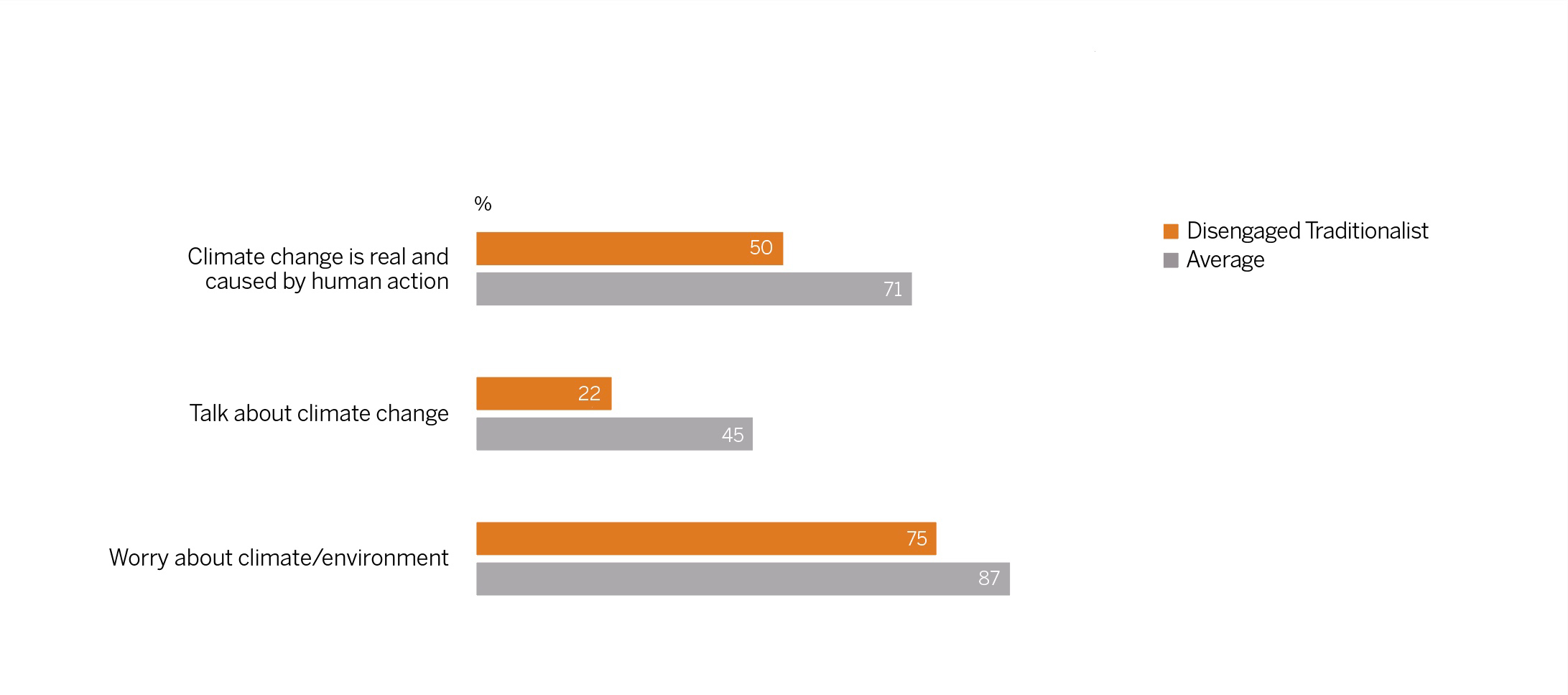
Disengaged Traditionalists are the least worried, engaged, or convinced about climate change
Disengaged Traditionalists are the least likely to act on climate change personally, the least concerned about climate change and environmental issues, and the least likely to talk about climate change. They are the most likely to say they feel ‘no emotions’ about climate change. Although they report a degree of sadness and anxiety, these responses are ‘flat’ compared to the other segments.
Yes, it is due to human action, which is why I believe that we all need to do our part to change the way things are going. But I think it needs to come from higher up. It needs to come from the government, it needs to come from businesses and the media … a lot of people don’t do anything because maybe it’s not in front of them, they’re not being told to do it.”
Even on the question of changes in the weather, only 36% of Disengaged Traditionalists think the effects of climate change are already apparent in the UK (this figure is closer to 50% or higher for other segments). Alongside Backbone Conservatives, they are the least likely to perceive a link between environmental degradation and Covid-19.
From food waste to climate change and air pollution, they are a full 10 percentage points behind the next segment, marking them out as the least engaged segment on all environmental issues. While they recognise tangible environmental risks like air pollution, Disengaged Traditionalists are unlikely to respond well to messages that mark them out as a group that is more ‘vulnerable’ to such threats. They are reluctant to see themselves in that way, in keeping with a tenacious type of optimism.
In fact, despite being one of the lowest income segments, Disengaged Traditionalists are the least supportive of fair taxation to protect vulnerable people. Their meritocratic beliefs (i.e. that people tend to get what they deserve in society), perhaps in combination with not self-identifying as vulnerable, make them closer to Backbone Conservatives on this question.
The government is doing what they can to help people get through this period of time, whether it’s businesses or individuals, with all of the grants and payment schemes, job retention and all that. My concern is how we will pay for this in the future. Is that going to be in rising taxes? How is the government going to cover this? Because while it’s okay for some people to be able to claim this to get through this period – and to touch on the point that someone else made, it’s not really been fair for everybody. Some people have missed out on this totally.”
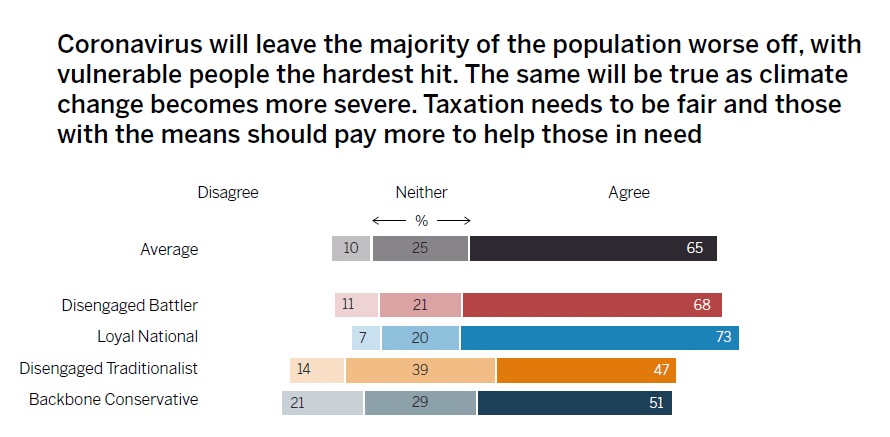
Disengaged Traditionalists are less likely to support ‘fair taxation’ to help the vulnerable
Disengaged Traditionalists are the least likely to have signed a climate change petition (5%) and to have voted on the basis of a political party’s climate change policy (4%). Just 1% have attended a climate change protest. They have the lowest levels of trust in environmental charities of any segment – although their faith in scientists and David Attenborough is closer to the norm – and they consistently see the fewest benefits of climate action.
I think the politicians need to lead. Businesses and politicians need to show the way. Individuals, it’s hard to police, and so many of them will only do something if they have to do it and they’re told to do it. So, I think it comes from the top. The politicians and businesses have to show the way.”
Net zero
Disengaged Traditionalists tend to express abstract, detached views on net zero and generally lack firm opinions on many issues. While a significant minority are non-voting, the top issues that inform the Disengaged Traditionalists’ vote are “healthcare and the NHS”, “cost of living” and “the economy”, although their priorities are more varied than those of other segments. In some areas, Disengaged Traditionalists align most closely with Backbone Conservatives. For instance, these two segments are the most likely to say that the Conservative Party has the best climate policies (although 50% of Disengaged Traditionalists don’t know, or say none of the parties do).
Of all segments, they are the least knowledgeable about net zero, with only 31% choosing the correct definition out of four options. In focus groups, Disengaged Traditionalists felt that the 2050 net zero target was very far away and were therefore vaguely optimistic that it could be achieved by then. Despite this, their support for environmental policies tends to be lower than that of other segments; they are least likely to support low traffic neighbourhoods (45%) and are also the least likely to want to pay a flight tax (40% were completely unwilling to pay any kind of flight tax).
Disengaged Traditionalists resist any prospect of higher costs: when asked about what would be fair vehicle taxes for different categories of car, this segment indicated that all cars should pay average or lower than average taxes. While still low compared to other segments, Disengaged Traditionalists also say that retraining those who work in coal and gas industries is an important part of the UK reaching net zero, so an honest and practical approach to retraining may connect with this segment.
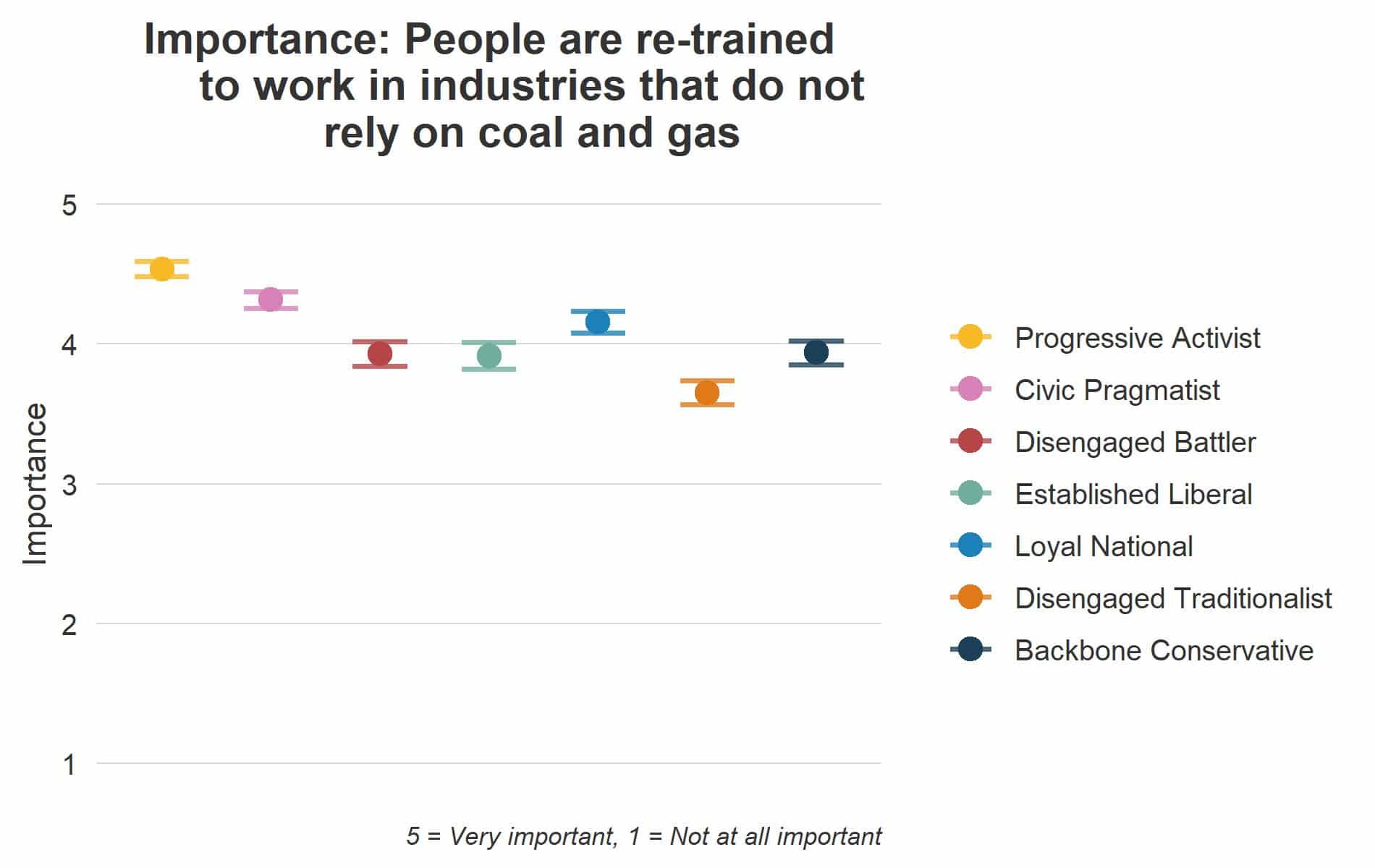
Importance of the provision of retraining opportunities in the UK reaching net zero, by segment. Data: Jan 2022.
For Disengaged Traditionalists, life is fundamentally unfair: you get out of life what you put in. Fairness is something that is up to individuals to achieve for themselves, rather than something to be provided by the system, by the government or by any other institution. Disengaged Traditionalists appear to hold the view that environmental taxes and benefits are generally unfair, no matter whether they are for the rich or for the poor. They believe it’s especially unfair for high-income households to receive government grants or tax benefits for environmentally friendly changes, but they don’t see these measures as fair for low-income households either.
I honestly believe, in general, UK society is fair, in that if you want to put the effort in, you can turn your life around or make your life better than what it was previously.”
Risk: Their engagement with net zero and climate action is relatively shallow and therefore unstable, so they are susceptible to being swayed in either direction. Their view that the world is fundamentally unfair means fairness arguments in favour of climate action are not likely to land.
Opportunity: One or two areas should be selected in which connections with this group can be strengthened (e.g. cost of living, low traffic neighbourhoods and retraining).
Narrative recommendation: Linking net zero policies to the diverse range of everyday issues that concern Disengaged Traditionalists may bring the issue closer to them, for instance talking about nature and biodiversity as a way to reduce mental health issues, or encouraging reconnection with nature rather than social media and technology.
Disengaged Traditionalists struggle to name anyone in public life that they trust or feel represents their interests and concerns. Only 15% said that they feel represented by charities that help animals, and 9% named local community groups and 10% named charities that help vulnerable citizens, while the most common response (51%) was “none of the above” – the second highest proportion after Disengaged Battlers (55%).
This segment is also the least enthused about the UK taking action on the international stage; the least likely to support the UK being one of the most ambitious countries in the world when it comes to addressing climate change; and the least likely to support richer countries paying for poorer countries’ costs to cut carbon emissions and adapt to climate change (33% for and 45% against). However, in focus groups, Disengaged Traditionalists largely agreed that richer countries have a responsibility to support poorer countries who will be more affected by climate change, whether financial or technological, and wanted to see that the efforts were having an impact.
The way in which they should be helping isn't just necessarily financial, it's about the sharing of technology. [Another participant] mentioned that the way forward is wind power, solar power and what have you, it's about sharing that technology with India, China, and encouraging them to use the new technologies to replace their coal-fired power stations.”
I don't think any amount [rich countries pay to poorer countries] would be enough but if we saw results of what it's actually doing, I wouldn't mind paying more. The taxpayers are paying, not the government themselves, it's the likes of me and everyone on the call that are paying, I don't see where my money is going. ... I want evidence, I want a documentary of how that money is processed, I want to see it being used, I want to see it buying the technology, I want to see it helping families. I want to see people over there physically helping developing countries and go back on a monthly, yearly basis, whatever.”
Disengaged Traditionalists are also the least willing to make personal changes to their lives to reduce their impact on the environment. They are the segment most likely to say that it’s important to them that they should not need to change the way they live as a result of the UK’s efforts to reach net zero. This permeates actions across different sectors, from diet to home energy, yet there is some willingness among a minority within the segment. Despite being the least likely segment to want to reduce their meat consumption, 25% are willing to reduce it in some way, and 8% already do not eat meat.
The change is taking place already now, isn't it ...? Because if you look at the supermarkets, the shelves are full of vegetarian choices. If you go into any restaurant, there's multiple choice of vegetarian meals. More and more of the country is eating vegetarian meals now than they've ever eaten. When I came to the UK from India, in the 1970s, this country was a big meat eating country, it no longer is, so the shift is going that way anyway.”
NEW: Climate policy support and involvement
Biggest Issues (after cost of living and NHS)
- Immigration and refugees
- Taxes
- Crime
Most worried that climate change might…
- Cause my bills and other costs to rise
- Harm nature and wildlife
- I am not worried about climate affecting my life in the next ten years
Reasons to not participate in consultations
1) Don’t know
2) I don’t trust MPs so don’t want to engage with them
3) Me taking part won’t make a difference
Reasons to participate in consultations
1) Don’t know
2) It’s important that local people have a say in things that concern their local area
3) I don’t trust others to make decisions for me
Three ways to engage Disengaged Traditionalists in climate policy change
- Talk about the climate concern that people like them have, and that everyone wants to do their bit: make concern feel common sense, realistic and beneficial for a range of reasons.
- Talk about why rules matter to make the transition fair for everyone: this segment needs to see everyone playing by the rules and the reasoning behind why policies and restrictions have been put in place. Show why policies are sensible and necessary to achieve net zero goals, how policies address everyone, but also how they hold big businesses and other polluters to account.
- Build trust, then address freedom and cost concerns: it’s important that communicators and leaders pass the mic to trusted messengers to talk about how policies are viable, and to address freedom and cost concerns – especially when it comes to policies to do with cars.
See the Seven segments 2024 overview here.
Animated by law and order, Disengaged Traditionalists are rules focused
Disengaged Traditionalists have always been motivated by rules, and this has become more apparent with high-profile rule breaks in recent years. For example, they can be highly animated by stories of water companies illegally dumping sewage in rivers – and are likely to be supportive of tougher punishments for this sort of crime (and opposed to protestors who break the law to draw attention to their cause).
This segment believes in rules to target those most responsible for climate change – big businesses and other polluters.
I mean eventually petrol companies like Shell and things like that, they will [benefit from climate policies] because they've got the petrol station forecourt, they will turn electric at some point and they will change their business, but I don't think it's going to happen in the next 10 years. Why would they sort of thing? I think there needs to be government pushing these companies to stop making petrol cars or stop selling petrol before we will change.”
Disengaged Traditionalist, Essex
They see the need for climate policies, but are not convinced they will lead to positive changes for them personally
This segment would not personally feel positive about climate policies being put in place. However, when asked whether certain climate policies and initiatives would be ‘going too far’, Disengaged Traditionalists feel that most of the policies presented to them were reasonable.
They are not against climate policies, but do not see how they will benefit them, and are unlikely to vote based on climate.
When looking at what climate policies this segment feels are most important for the government to prioritise, policies focusing on home heating – both increasing efficiency and reducing reliance on oil and gas, protecting nature & wildlife, ensuring availability of food and protecting against extreme weather events come first.
Note: These results for Disengaged Traditionalists are based on a smaller sample, so should be interpreted with caution.
Transport policies are much less supported
Disengaged Traditionalists have concerns over freedoms being curtailed, as well as concerns around increasing costs to the individual. Disengaged Traditionalists are the least likely to think ‘policies relating to public transport that the government might put in place’ will be fair to them (32%).
Transport policies could risk backlash among this segment if concerns over freedom and cost are not addressed carefully.
“I have a bit of a concern about just containing freedoms if you know what I mean. There's something about influencing people through maybe taxes, prices, education and all that. That's one thing. But… there's 15 minute cities that are being proposed and you can only do so many trips or something within a certain radius of that city, I think I could imagine major problems with that.”
Disengaged Traditionalist, Essex
At the moment it would definitely be unfair [banning sale of new petrol and diesel cars by 2035] because a lot of people wouldn't be able to afford that. But what also has to be worth mentioning is that the cost for the electric vehicles are going to come down a lot in say the next ten, five years. So it all depends on how much they cost in five years really, because if they're still 30 grand in five years, then in 10 years time they're not going to be able to implement that legislation anyway, let's be honest. But if they're 10 grand and continue to go a lot cheaper after that it might be a little bit more accessible but I don't think they'll end up implementing in 10 years time anyway.”
Disengaged Traditionalist, Essex
Engaging Disengaged Traditionalists
Messages about ‘acting on climate change’ are unlikely to land positively with this segment – although their scepticism seems to have softened during Covid-19. Instead, build on their pride as hard-working, honest people and emphasise business regulation and other highly structured government policies that don’t pass responsibility on to the individual. Be conscious of their ‘red flags’ to avoid alienating them and playing into culture war dynamics.
Key takeaways
Avoid climate-led messages, which are likely to backfire
This is the segment that is closest to being sceptical about climate change (even with the softening of their views during Covid-19) and so messages positioned as being about ‘acting on climate change’ will not reach them successfully. Talk instead about manufacturing being fit for the 21st century, or building on our proud industrial past (e.g. British steel) to engage around green jobs and the low-carbon transition.
Choose your messenger carefully
With lower levels of trust in environmental charities than any other segment, the reality is that NGO or ‘green’ branded messages are likely to be ignored. Seek out trusted messengers – ordinary people whose jobs are changing for the better, and farmers who are wedded to the land and can speak from a position they respect and understand.
Build trust, as this is only the beginning of the conversation
Initial polling of the sector suggests very few campaigners are reaching – or trying to reach – this segment. This could therefore mark the beginning of a conversation with an unfamiliar part of the British population. Listening is critical: Disengaged Traditionalists feel unheard and unrepresented.
Try out the tax the rich argument
Defending green levies (on consumer goods or bills) is unlikely to resonate with this group and may even have a negative effect. Push the tax agenda more along ‘Robin Hood’ lines, with arguments that the big energy companies (and other corporates) should be paying their fair share instead of expecting the little people to pick up the tab.
Disengaged Traditionalists don’t view themselves as ‘victims’ of injustice
This segment is unlikely to respond well to messages that position climate change, Covid-19, or the intersection between them, as a question of social justice – especially if the suggestion is that Disengaged Traditionalists belong to the segment on the receiving end of the injustice. They don’t see themselves in this way.
Continue exploring
Sign up to our newsletter
Thank you for signing up to our newsletter
You should receive a welcome email shortly.
If you do not receive it, please check your spam folder, and mark as 'Not Spam' so our future newsletters go straight to your inbox.

